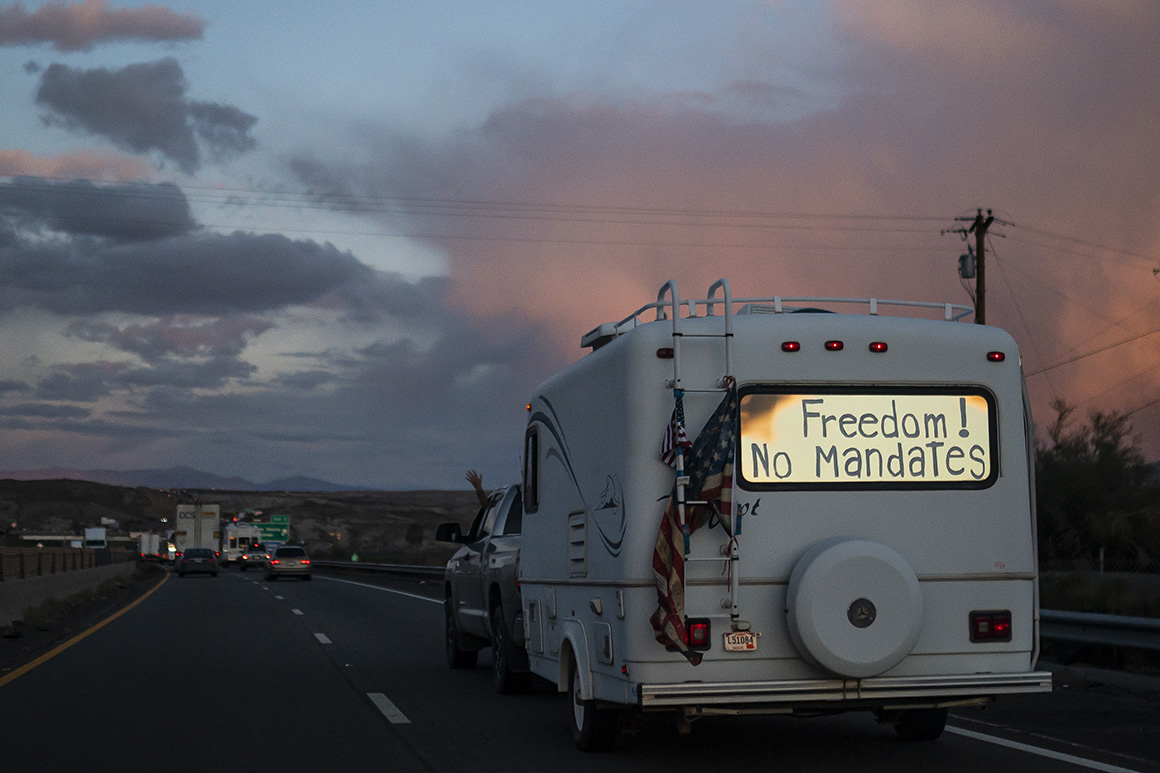 Police face off with demonstrators participating in a protest organized by truck drivers opposing vaccine mandates on Wellington St.on Feb.19 in Ottawa, Ontario.| Alex Kent/Getty Images “There is a reason these petty authoritarians around the world hate Bitcoin and crypto: They can’t control it,” Sen.Ted Cruz (R-Texas) told POLITICO in a statement.“The playbook of the modern radical left is that if you don’t comply, they’re willing to destroy your reputation and your personal finances.”
Police face off with demonstrators participating in a protest organized by truck drivers opposing vaccine mandates on Wellington St.on Feb.19 in Ottawa, Ontario.| Alex Kent/Getty Images “There is a reason these petty authoritarians around the world hate Bitcoin and crypto: They can’t control it,” Sen.Ted Cruz (R-Texas) told POLITICO in a statement.“The playbook of the modern radical left is that if you don’t comply, they’re willing to destroy your reputation and your personal finances.”
While support for the Freedom Convoy truckers was hardly universal, Trudeau’s use of emergency authority — later extended by Canada’s House of Commons — has reignited debates around how anonymous digital transactions can simultaneously bankroll civil disobedience and embolden illegal activity.He revoked the emergency after crowds were dispersed from downtown Ottawa.
Meanwhile, the blowback over Trudeau’s response has sparked copycat convoys that are making their way to Washington.Hundreds assembled in Southern California, intending to drive cross-country to protest almost two years of U.S.
lockdowns, mask mandates and other public health measures taken to combat Covid-19.
Former President Donald Trump blistered the Canadian government’s tactics at the Conservative Political Action Conference in Orlando, Fla., on Saturday, telling a fired-up crowd that “you’re either with the peaceful truckers or you are with the left-wing fascists.”
Congressional Republicans are lobbing grenades as well.
“It’s the Communist Party of China’s strategy.It’s really just concerning that it’s come to the Western Hemisphere,” Rep.Tom Emmer (R-Minn.), who co-chairs the Congressional Blockchain Caucus, said in an interview, referring to Trudeau’s actions.“When your central government can control your movement, your speech, everything about your freedom? That’s not freedom.
And this is really what’s at stake.”
Privacy advocates and human rights groups have long considered digital assets a way to bypass payment systems that are overseen by traditional financial institutions and government agencies.That can be useful if you’re directing aid to civil liberties groups operating under authoritarian regimes, said Alex Gladstein of the Human Rights Foundation, a group chaired by Russian pro-democracy advocate and chess champion Garry Kasparov.
But Gladstein noted that the same tools can also embolden money launderers, drug traffickers and scammers.
That’s no small thing for governments concerned with the growing popularity of decentralized finance platforms, which allow individuals to conduct transactions without having to use banks or credit card services.
Data firm Chainalysis estimates that cryptocurrency-based crime climbed by 79 percent to a record $15.8 billion in 2021 — even as illicit activity’s share of crypto’s booming transaction volumes plummeted.
Criminals also use conventional payment and financial systems for scams all the time, crypto lobbyists point out.Even so, with U.S.regulation of digital markets still in its infancy, members of Congress like Sen.
Elizabeth Warren (D-Mass.) and federal agencies have raised alarms about the lack of visibility into the ownership of digital wallets that can be used to transfer crypto assets across borders outside traditional channels.
Prime Minister of Canada Justin Trudeau speaks at the U.S.Capitol on Nov.17, 2021.| Drew Angerer/Getty Images
Trudeau’s emergency orders attempted to cut to the quick in that regard.
After GoFundMe kicked a fundraiser for the Freedom Convoy off its platform, supporters soon flocked to another effort spurred by Bitcoin-focused social media influencers.The new push, hosted on the crowdfunding platform Tallycoin, soon amassed some $1 million in Bitcoin to cover truckers’ food, accommodations and other basic necessities as the protest dragged into its third week.
Trudeau’s emergency order sought to block the disbursement of those funds by targeting accounts held on virtual currency exchanges that require names and addresses to adhere to anti-money laundering and know-your-customer rules.
Leaders of major crypto exchanges like Kraken and Coinbase blanched at the order, urging their Twitter followers to consider decentralized services where they would have custody of their own crypto if they were concerned about any government freezing their accounts.Attempts to block transactions on decentralized services, including those that offer digital wallets without collecting personalized information, were met with derision .
Even after the House of Commons voted to uphold the emergency orders and Ottawans who had their lives disrupted by the protests sued for relief, Trudeau’s actions became common cause for crypto libertarians looking to avoid government oversight of their markets.
“The common argument for gun ownership is that we have guns as a last resort to protect ourselves — in this country — against a corrupt government [if it] turns against the people,” said Kraken co-founder and CEO Jesse Powell, whose firm is currently seeking a master account with the Federal Reserve.
“Bitcoin can be one of those defense mechanisms as well.”
Crypto proponents on Capitol Hill are casting similar arguments — albeit in less intense terms — noting that Americans’ growing reliance on electronic payments through bank accounts, credit cards and other online services provide the government more ways to surveil or crack down on transactions deemed illegal or problematic.
Multiple sources said Canada’s attempt to rein in digital assets to support protests underscored the need for maintaining some level of privacy protections around crypto transactions.Jerry Brito, executive director of the crypto think tank Coin Center, noted that lawmakers recently sought to extend the Treasury’s authority to monitor and freeze accounts at financial institutions in a bid to curtail ransomware attacks, money laundering and other illegal activity.
Blockchain Association Executive Director Kristin Smith, whose trade group counts Kraken and other exchanges among its members, said the Ottawa protests could be a “teachable moment” — arguing that there would have been similar backlash had former President Donald Trump used such tactics to go after Black Lives Matter protests, for instance.
Rep.Warren Davidson (R-Ohio) listens at a House Financial Services Committee hearing on Capitol Hill.| Al Drago-Pool/Getty Images
Three days after Trudeau invoked emergency authorities, Rep.Warren Davidson (R-Ohio) introduced legislation that would bar federal agencies from implementing any rules that might prevent Americans from using crypto in peer-to-peer transactions.
Davidson said he had been considering introducing the bill for more than a year — ever since then-Treasury Secretary Steven Mnuchin proposed rules to improve the federal government’s oversight of decentralized finance.But the Canada protests highlighted that the privacy “risks for not protecting this are great,” he said in an interview.
“A lot of the same folks who really love the Patriot Act also hate crypto,” he said.
Filed under: Elizabeth Warren , Elizabeth Warren 2020 , Canada , Ted Cruz , Protests , Protesters , Finance & Tax , Justin Trudeau POLITICO
Link Copied.
